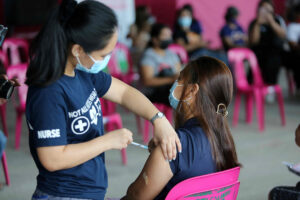By Kyle Aristophere T. Atienza, Reporter
DAILY coronavirus cases in the Philippines would likely fall to fewer than 1,000 starting next week, according to pandemic monitoring group OCTA.
“We should be seeing fewer than 1,000 new cases daily. The situation for COVID-19 will be back to low levels,” OCTA fellow Fredegusto P. David said in a Facebook Messenger chat. He said any possible COVID-19 infection wave in the future would likely become manageable and would not overwhelm hospitals.
“COVID-19 will be back with another wave but we don’t expect it to be different from the other waves we saw this year and last year,” he said.
On Saturday night, Mr. David said the Philippines posted 878 new cases with 1,328 new recoveries. No COVID-19-related deaths were reported during the day, when active cases in the country hit more than 11,600.
Metro Manila accounted for 206 of the new cases recorded on June 10, followed by Cavite with 57, Iloilo and Pampanga with 48 each, and Bulacan with 52 cases.
On June 5, health authorities reported that the country had recorded 9,107 COVID-19 infections from May 22 to June 4 with a daily average of 1,301 — 22% lower than the average cases per day from a week earlier.
Last month, when daily COVID-19 infections in the country had hit almost 2,000, the Private Hospitals Association of the Philippines, Inc. (PHAPI) said patients admitted in private hospitals who tested positive for COVID-19 had increased.
It said most of the admissions were “coincidental COVID,” a label used for patients who were admitted for different health issues but tested positive for COVID-19 when screened. The Philippines’ new Health secretary, Teodoro Herbosa, has yet to discuss how the Philippines plans to deal with the pandemic.
Maria Rosario S. Vergeire, who temporarily headed the Health agency prior to Mr. Herbosa’s appointment, said in May that the inter-agency task force handling the country’s pandemic response had submitted its recommendations to Mr. Marcos Jr. in light of the WHO’s declaration.
As Health secretary, Mr. Herbosa will deal with a weak healthcare system, which has struggled with a critical shortage of healthcare workers.
NURSESLast week, the new DoH chief said he will consider allowing nursing graduates without a license to work in government hospitals.
Under the proposal, nursing graduates will be given enough time — probably five years — to take and pass the licensure examination while employed, Mr. Herbosa said.
About 40% to 50% of nurses in private hospitals have quit their job in the last two years due to salary issues, the PHAPI earlier said.
